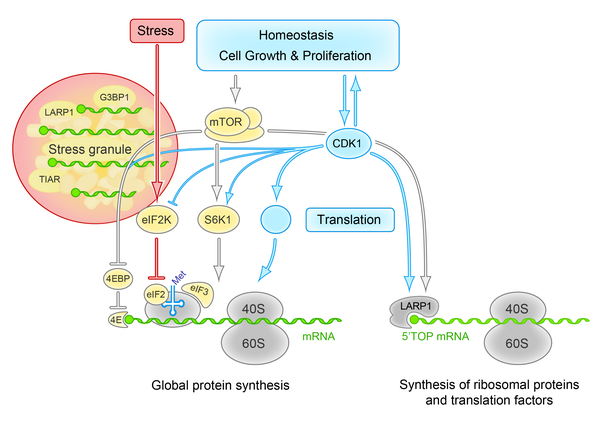Sie befinden sich hier
Inhalt
Translation control and phase transitions in cellular homeostasis and stress responses
Cell growth, proliferation and progression through the cell cycle strongly depend on the synthesis of new proteins. Based on our discovery that the major cell cycle kinase CDK1 promotes translation via multiple downstream targets with a strong impact on the translation of 5’TOP mRNAs encoding ribosomal proteins and translation factors1, we explore the coordinated regulation of protein synthesis, ribosome biogenesis and proliferation rates. In response to cellular damage, cells mount adaptive stress responses aimed at repair or removal of damaged molecules and efficient return to homeostasis. The group further investigates how liquid-liquid phase separation events; in particular the assembly of cytoplasmic stress granules, affects cell cycling and survival.
Selected publications
- Haneke K*, Schott J, Lindner D, Hollensen AK, Damgaard CK, Mongis C, Knop M, Palm W, Ruggieri A, Stoecklin G. CDK1 couples proliferation with protein synthesis. J Cell Biol 219:e201906147 (2020)
- Eiermann N, Haneke K*, Sun Z, Stoecklin G, Ruggieri A. Dance with the Devil: Stress Granules and Signaling in Antiviral Responses. Viruses 12:984 (2020).
- Lafarga V, Sung HM, Haneke K*, Roessig L, Pauleau AL, Bruer M, Rodriguez-Acebes S, Lopez-Contreras AJ, Gruss OJ, Erhardt S, Mendez J, Fernandez-Capetillo O, Stoecklin G. TIAR marks nuclear G2/M transition granules and restricts CDK1 activity under replication stress. EMBO Rep 20:e46224 (2019).
- Roth H, Magg V, Uch F, Mutz P, Klein P, Haneke K*, Lohmann V, Bartenschlager R, Fackler OT, Locker N, Stoecklin G, Ruggieri A. Flavivirus Infection Uncouples Translation Suppression from Cellular Stress Responses. MBio 8:e02150 (2017).
*Katharina Hoerth, former Haneke
Kontextspalte
Project Group Leader


